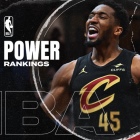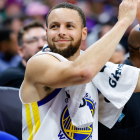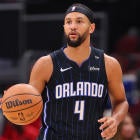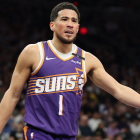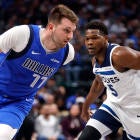
Bradley Beal's days in Washington might be numbered, as the two sides will work to find a suitable trade for Beal if the Wizards decide to begin to rebuild. As an accomplished player with three All-Star selections under his belt, one would think that teams would be lining up to try acquire Beal.
But, while Beal will certainly have some suitors (more on that here), teams might be hesitant to trade for him for a few reasons. Let's dive into four reasons why there might be Beal trade reluctance.
1. The enormous contract
The first and most obvious reason why some squads might think twice before pulling the trigger on a deal for Beal is the financial investment. Beal still has four years remaining on the gigantic five-year, $251 million contract he signed with Washington just last offseason. Here's a quick look at how the remainder of Beal's contract breaks down, via Spotrac:
- 2023-24: $46.7 million
- 2024-25: $50.2 million
- 2025-26: $53.6 million
- 2026-27: $57.1 million (player option)
That's a whole lot of money over an extended period of time, and adding that contract onto the books would greatly limit the short-term financial flexibility of the receiving team. A team would have to be extremely confident that Beal's production would match, or even exceed, his contract value over the next few seasons, and that he would in turn raise the ceiling of the team substantially. Let's just say it's fair to be skeptical of that.
Beal has been a very good player over the course of his career, but he hasn't proven to be a franchise-changer. The Wizards have only made the playoffs in two of the past six seasons with Beal, and they lost in the first round both times. Perhaps a new environment and a better supporting cast would yield better results for Beal, but again, it's fair to be skeptical of that.
Also, the NBA's new Collective Bargaining Agreement includes features that will make it more difficult -- and costly -- for teams to acquire new, expensive players, and that will almost assuredly have an impact on Beal's market.
2. Injury history
Even if a team could stomach the staggering sticker price, lingering questions regarding Beal's health and durability moving forward could be a deterrent. Beal played in just 90 of a possible 164 games over the past two seasons due largely to wrist and hamstring injuries.
Beal was an ironman of sorts earlier in his career, as he played in all 82 regular season games for the Wizards during both the 2017-18 and 2018-19 seasons. However, he hasn't appeared in more than 60 games in a single season since. Might that be a trend that continues? Beal, who will turn 30 later this month, isn't getting any younger, and it gets harder and harder for athletes to remain consistently healthy as they age. If Beal was, say 25, stomaching the size and length of his contract would probably be easier for organizations, but the combination of his age and mounting injury issues are factors that simply can't be ignored.
3. Declining production
Though it's probably tied in large part to the aforementioned injury issues, Beal's decline in production over the past two seasons could also be an eyebrow-raiser for potential suitors. During the 2020-21 season, Beal was the second-leading scorer in the NBA with an average of 31.3 points per game. Only Stephen Curry (32.0) averaged more.
In the two seasons since, Beal's scoring and efficiency have both dipped dramatically. He averaged 23.2 points per performance in each of the past two seasons, while recording his two worst campaigns in terms of 3-point percentage. And the thing with Beal is if he's not scoring the ball at a high clip, he's not doing too much more as he's never been an elite defender, playmaker or rebounder.
This isn't to say that Beal's offensive production can't climb back up in the future -- he might have a ton of great ball left in him, but it's tough for a team to feel too great about moving mountains to land a guy whose coming off of two relatively down seasons.
4. His no-trade clause
It also must be noted that even if a team is willing to overlook all of these potential red flags and makes a competitive, attractive offer to Washington, that doesn't necessarily mean that a deal will get done, because Beal has a no-trade clause in his contract. So, he gets the ultimate say on any deal. This doesn't necessarily limit the number of teams that might be interested in his services, but it could definitely limit the number of potential destinations.
Beal has been mentioned in trade rumors and speculation for years now, but nothing his ever come to fruition. But now, with the Wizards pondering a rebuild and Beal facing down his own athletic mortality, maybe the two sides are finally ready to move in different directions. If that ends up being the case, finding a suitable deal for the star guard will be easier said than done for Washington.
![[object Object] Logo](https://sportshub.cbsistatic.com/i/2020/04/22/e9ceb731-8b3f-4c60-98fe-090ab66a2997/screen-shot-2020-04-22-at-11-04-56-am.png)












